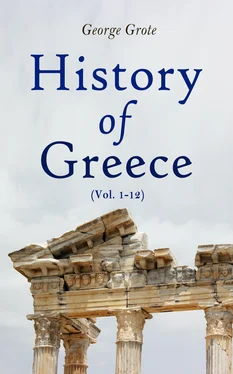George Grote - History of Greece (Vol. 1-12)
Здесь есть возможность читать онлайн «George Grote - History of Greece (Vol. 1-12)» — ознакомительный отрывок электронной книги совершенно бесплатно, а после прочтения отрывка купить полную версию. В некоторых случаях можно слушать аудио, скачать через торрент в формате fb2 и присутствует краткое содержание. Жанр: unrecognised, на английском языке. Описание произведения, (предисловие) а так же отзывы посетителей доступны на портале библиотеки ЛибКат.
- Название:History of Greece (Vol. 1-12)
- Автор:
- Жанр:
- Год:неизвестен
- ISBN:нет данных
- Рейтинг книги:5 / 5. Голосов: 1
-
Избранное:Добавить в избранное
- Отзывы:
-
Ваша оценка:
- 100
- 1
- 2
- 3
- 4
- 5
History of Greece (Vol. 1-12): краткое содержание, описание и аннотация
Предлагаем к чтению аннотацию, описание, краткое содержание или предисловие (зависит от того, что написал сам автор книги «History of Greece (Vol. 1-12)»). Если вы не нашли необходимую информацию о книге — напишите в комментариях, мы постараемся отыскать её.
History of Greece (Vol. 1-12) — читать онлайн ознакомительный отрывок
Ниже представлен текст книги, разбитый по страницам. Система сохранения места последней прочитанной страницы, позволяет с удобством читать онлайн бесплатно книгу «History of Greece (Vol. 1-12)», без необходимости каждый раз заново искать на чём Вы остановились. Поставьте закладку, и сможете в любой момент перейти на страницу, на которой закончили чтение.
Интервал:
Закладка:
The legendary age of the Greeks receives its principal charm and dignity from the Homeric poems: to these, therefore, and to the other poems included in the ancient epic, an entire chapter is devoted, the length of which must be justified by the names of the Iliad and Odyssey. I have thought it my duty to take some notice of the Wolfian controversy as it now stands in Germany, and have even hazarded some speculations respecting the structure of the Iliad. The society and manners of the heroic age, considered as known in a general way from Homer’s descriptions and allusions, are also described and criticized.
I next pass to the historical age, beginning at 776 B. C.; prefixing some remarks upon the geographical features of Greece. I try to make out, amidst obscure and scanty indications, what the state of Greece was at this period; and I indulge some cautious conjectures, founded upon the earliest verifiable facts, respecting the steps immediately antecedent by which that condition was brought about. In the present volumes, I have only been able to include the history of Sparta and the Peloponnesian Dorians, down to the age of Peisistratus and Crœsus. I had hoped to have comprised in them the entire history of Greece down to this last-mentioned period, but I find the space insufficient.
The history of Greece falls most naturally into six compartments, of which the first may be looked at as a period of preparation for the five following, which exhaust the free life of collective Hellas.
I. Period from 776 B. C. to 560 B. C., the accession of Peisistratus at Athens and of Crœsus in Lydia.
II. From the accession of Peisistratus and Crœsus to the repulse of Xerxes from Greece.
III. From the repulse of Xerxes to the close of the Peloponnesian war and overthrow of Athens.
IV. From the close of the Peloponnesian war to the battle of Leuktra.
V. From the battle of Leuktra to that of Chæroneia.
VI. From the battle of Chæroneia to the end of the generation of Alexander.
The five periods, from Peisistratus down to the death of Alexander and of his generation, present the acts of an historical drama capable of being recounted in perspicuous succession, and connected by a sensible thread of unity. I shall interweave in their proper places the important but outlying adventures of the Sicilian and Italian Greeks,—introducing such occasional notices of Grecian political constitutions, philosophy, poetry, and oratory, as are requisite to exhibit the many-sided activity of this people during their short but brilliant career.
After the generation of Alexander, the political action of Greece becomes cramped and degraded,—no longer interesting to the reader, or operative on the destinies of the future world. We may, indeed, name one or two incidents, especially the revolutions of Agis and Kleomenês at Sparta, which are both instructive and affecting; but as a whole, the period, between 300 B. C. and the absorption of Greece by the Romans, is of no interest in itself, and is only so far of value as it helps us to understand the preceding centuries. The dignity and value of the Greeks from that time forward belong to them only as individual philosophers, preceptors, astronomers, and mathematicians, literary men and critics, medical practitioners, etc. In all these respective capacities, especially in the great schools of philosophical speculation they still constitute the light of the Roman world; though, as communities, they have lost their own orbit, and have become satellites of more powerful neighbors.
I propose to bring down the history of the Grecian communities to the year 300 B. C., or the close of the generation which takes its name from Alexander the Great, and I hope to accomplish this in eight volumes altogether. For the next two or three volumes I have already large preparations made, and I shall publish my third (perhaps my fourth) in the course of the ensuing winter.
There are great disadvantages in the publication of one portion of a history apart from the remainder; for neither the earlier nor the later phenomena can be fully comprehended without the light which each mutually casts upon the other. But the practice has become habitual, and is indeed more than justified by the well-known inadmissibility of “long hopes” into the short span of human life. Yet I cannot but fear that my first two volumes will suffer in the estimation of many readers by coming out alone,—and that men who value the Greeks for their philosophy, their politics, and their oratory, may treat the early legends as not worth attention. And it must be confessed that the sentimental attributes of the Greek mind—its religious and poetical vein—here appear in disproportionate relief, as compared with its more vigorous and masculine capacities,—with those powers of acting, organizing, judging, and speculating, which will be revealed in the forthcoming volumes. I venture, however, to forewarn the reader, that there will occur numerous circumstances in the after political life of the Greeks, which he will not comprehend unless he be initiated into the course of their legendary associations. He will not understand the frantic terror of the Athenian public during the Peloponnesian war, on the occasion of the mutilation of the statues called Hermæ, unless he enters into the way in which they connected their stability and security with the domiciliation of the gods in the soil: nor will he adequately appreciate the habit of the Spartan king on military expeditions,—when he offered his daily public sacrifices on behalf of his army and his country,—“always to perform this morning service immediately before sunrise, in order that he might be beforehand in obtaining the favor of the gods,” 1if he be not familiar with the Homeric conception of Zeus going to rest at night and awaking to rise at early dawn from the side of the “white-armed Hêrê.” The occasion will, indeed, often occur for remarking how these legends illustrate and vivify the political phenomena of the succeeding times, and I have only now to urge the necessity of considering them as the beginning of a series,—not as an entire work.
London, March 5, 1846.
PREFACE TO THE SECOND EDITION OF
VOLUMES I. AND II.
Table of Contents
In preparing a Second Edition of the first two volumes of my History, I have profited by the remarks and corrections of various critics, contained in Reviews, both English and foreign. I have suppressed, or rectified, some positions which had been pointed out as erroneous, or as advanced upon inadequate evidence. I have strengthened my argument in some cases where it appeared to have been imperfectly understood,—adding some new notes, partly for the purpose of enlarged illustration, partly to defend certain opinions which had been called in question. The greater number of these alterations have been made in Chapters XVI. and XXI. of Part I., and in Chapter VI. of Part II.
I trust that these three Chapters, more full of speculation, and therefore more open to criticism than any of the others, will thus appear in a more complete and satisfactory form. But I must at the same time add that they remain for the most part unchanged in substance, and that I have seen no sufficient reason to modify my main conclusions even respecting the structure of the Iliad, controverted though they have been by some of my most esteemed critics.
In regard to the character and peculiarity of Grecian legend, as broadly distinguished throughout these volumes from Grecian history, I desire to notice two valuable publications with which I have only become acquainted since the date of my first edition. One of these is, A Short Essay on Primæval History, by John Kenrick, M. A. (London, 1846, published just at the same time as these volumes,) which illustrates with much acute reflection the general features of legend, not only in Greece but throughout the ancient world,—see especially pages 65, 84, 92, et seq. The other work is, Rambles and Recollections of an Indian Official, by Colonel Sleeman,—first made known to me through an excellent notice of my History in the Edinburgh Review for October 1846. The description given by Colonel Sleeman, of the state of mind now actually prevalent among the native population of Hindostan, presents a vivid comparison, helping the modern reader to understand and appreciate the legendary era of Greece. I have embodied in the notes of this Second Edition two or three passages from Colonel Sleeman’s instructive work: but the whole of it richly deserves perusal.
Читать дальшеИнтервал:
Закладка:
Похожие книги на «History of Greece (Vol. 1-12)»
Представляем Вашему вниманию похожие книги на «History of Greece (Vol. 1-12)» списком для выбора. Мы отобрали схожую по названию и смыслу литературу в надежде предоставить читателям больше вариантов отыскать новые, интересные, ещё непрочитанные произведения.
Обсуждение, отзывы о книге «History of Greece (Vol. 1-12)» и просто собственные мнения читателей. Оставьте ваши комментарии, напишите, что Вы думаете о произведении, его смысле или главных героях. Укажите что конкретно понравилось, а что нет, и почему Вы так считаете.












